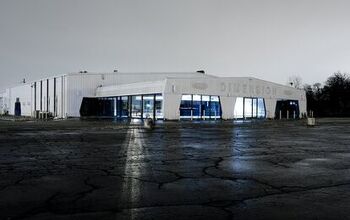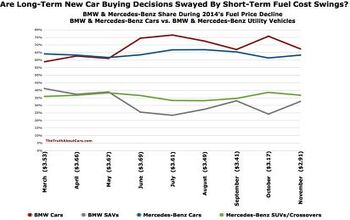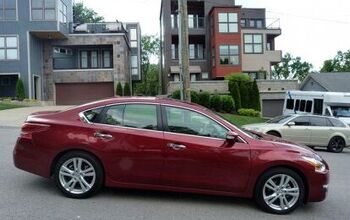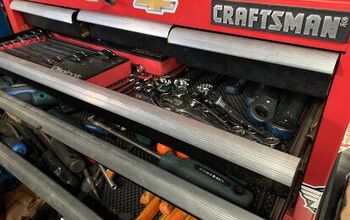U.S. Car Sales: The Unlucky Number Will Be 13

Many have been guessing what annual U.S. car sales would amount to this year. Some confused souls predicted sales as low as 10m. J.D.Power now has the pretty firm conviction that the year will end with 13.2m light vehicles sold for the year in the United States, down 18.5 percent from 16.2m in 2007, says the Automotive News (sub) who received an e-mail from J.D.Power. However, the big slump happened in the last 4 months. For the last 4 months, monthly sales were under 1 million. Total light-vehicle unit sales will hit 870,000 this month, down 37 percent from December 2007. Now THAT’S bad. That puts the seasonally adjusted annual rate to 10 million light vehicles in December, down from 10.3 million in November. Now THAT’S even worse. The rate had not fallen to 10 million since October 1982. Meaning: The worst is yet ahead. If the non-buying trend continues, the confused souls will be right next year and we could see only 10m units sold in 2009. China wanted to sell 10m units in 2008, a target they will not reach. With a little luck, and an economic stimulus program that works, China could make the target next year and, horror of horrors, turn into the world’s largest auto market.
PS: According to the China Association of Automobile Manufacturers (CAAM), Chinese auto makers produced about 8.7m automobiles and sold more than 8.6m from January to November. They will close out the year in the mid 9m.

Bertel Schmitt comes back to journalism after taking a 35 year break in advertising and marketing. He ran and owned advertising agencies in Duesseldorf, Germany, and New York City. Volkswagen A.G. was Bertel's most important corporate account. Schmitt's advertising and marketing career touched many corners of the industry with a special focus on automotive products and services. Since 2004, he lives in Japan and China with his wife <a href="http://www.tomokoandbertel.com"> Tomoko </a>. Bertel Schmitt is a founding board member of the <a href="http://www.offshoresuperseries.com"> Offshore Super Series </a>, an American offshore powerboat racing organization. He is co-owner of the racing team Typhoon.
More by Bertel Schmitt


































Comments
Join the conversation
The current sales are easily explained. The auto companies flooded the market with over supply of vehicles for several years, and now a recession is keeping them from continuing the practice. Once again, none of this is from a single mistake. In aviation, when you get yourself killed by unexpected circumstance, you can still get blamed for the accident. That's because you are suppose to plan ahead, and because the accidents aren't just caused by a single event. Everything is about redundancy and contingency. When people die in a plane crash, or gigantic institutions fail, it's not JUST because of circumstance, it's because the circumstance combines with other mistakes to overwhelm the crew. I would also say that based on VALUE, not price, modern cars are positively cheap. If you spent 15k in the eighties, you did not get what 15k gets you today as far as power, build quality, safety, and reliability. Cars are CHEAPER today.
I think I'm with ronin on this one. Huge, 72 month loans with no down payment are for people who fail at math. Keep your car another year or five, and that nets you a 100% savings on the cost of a new car. Or, if you really want to waste your money, save it up and buy the car you can afford, and save 15 or 20% on the cost of the car, versus financing it. Seems obvious to me.
Cars are much cheaper per mile now than they were in the '70s when you could expect that after you made that 36th and final payment you'd be lucky to get a "free year" before incurring some $300+ (in less-inflated 1970s $) repair. Most common was an entire exhaust system if you lived in the Rust Belt. Didn't matter if it was Japanese, European, or domestic. Compared to domestics Japanese and the Europeans had more troubles with premature rust and electrical than with mechanicals. But nearly every vehicle cost you the equivalent of 6 new-car payments between the 36th and 60th month of ownership which is why many people got rid of them in 3-4 years. My '97 Ranger has cost me approx. $300 in repairs other than belts, hoses, tires and other "normal-wear" items over an 11-year period. I still have the entire original exhaust system. All of these above-mentioned rubber wear items last longer than they did 30 year ago, as well. If one kept a '72 Ford pickup til '83, he'd have averaged at least $300 PER YEAR in such repairs. I know, because I did just that. The average 11 year old vehicle in 2008 looks and drives a lot nicer than the average 10 year old vehicle did in 1983. The car market will take a long time to work so many perfectly-good 1-10 year-old vehicles through it without government intervention such as tax credits for new car purchases, sky-high gas taxes to get still-good but gas-thirsty big SUVs to the junkyard early, etc.
I bought a new Honda in October as an additional car to my household. Credit was easily available through my credit union. Honda also offered a competitive loan. I will always want to buy a new car over used. My next new car purchase is probably three years out when I'll want to replace one of my current Jeeps with a new model. I'd like that to be a Grand Cherokee if whoever owns Jeeps at that time still makes it? That will be true even if gas is in the $5/ gal. range again.